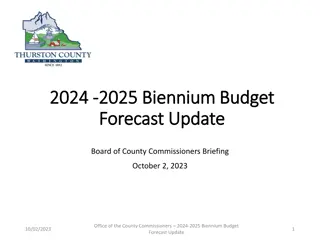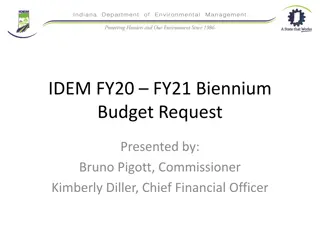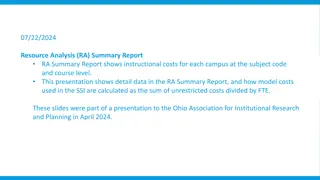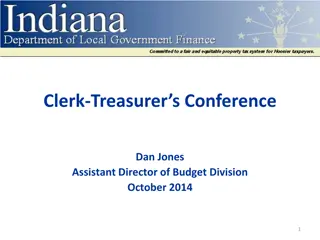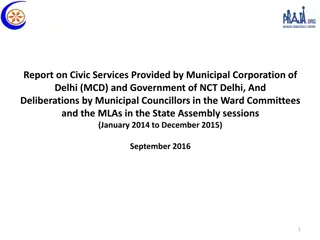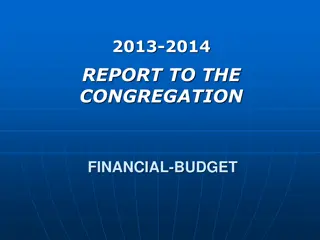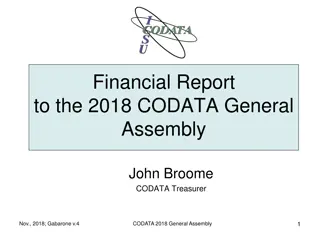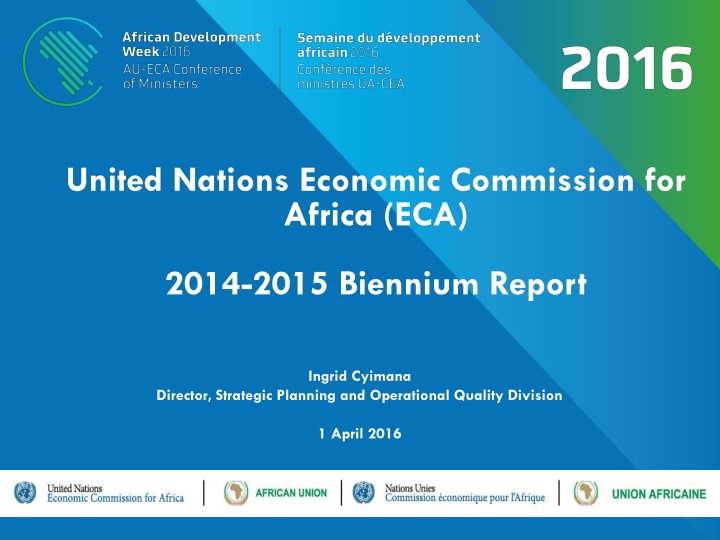
United Nations Economic Commission for Africa (ECA) Policy Influence Report 2014-2015
The United Nations Economic Commission for Africa (ECA) focused on influencing policy agendas in the 2014-2015 biennium, supporting Africa's priorities in global and continental settings. It aimed to empower Africa to shape its own narrative and drive structural transformation. The report highlights achievements in various areas such as the Agenda 2030 for Sustainable Development, the Addis Ababa Action Agenda, and support for regional integration initiatives. ECA played a key role in providing policy research, knowledge delivery services, and accountability mechanisms to enhance its impact.
Download Presentation

Please find below an Image/Link to download the presentation.
The content on the website is provided AS IS for your information and personal use only. It may not be sold, licensed, or shared on other websites without obtaining consent from the author. If you encounter any issues during the download, it is possible that the publisher has removed the file from their server.
You are allowed to download the files provided on this website for personal or commercial use, subject to the condition that they are used lawfully. All files are the property of their respective owners.
The content on the website is provided AS IS for your information and personal use only. It may not be sold, licensed, or shared on other websites without obtaining consent from the author.
E N D
Presentation Transcript
United Nations Economic Commission for Africa (ECA) 2014-2015 Biennium Report Ingrid Cyimana Director, Strategic Planning and Operational Quality Division 1 April 2016
Principal Aims of ECA in 2014-2015 Biennium Think-tank of reference on Africa s development policy issues: Putting Africa first To influence priorities and programmes of key partners working on African development policy issues To empower Africa to narrate its own narrative To drive Africa s structural transformation based on its own priorities 1. Achieving policy influence in support of Africa s transformative agenda 2. Earning greater trust and credibility through the production of high-quality, evidence-based and good fit policy research and knowledge delivery services 3. Enhancing accountability mechanisms & deepening learning culture across all streams of work 4. Strengthening operational effectiveness to ensure better support for the timely delivery of ECA knowledge production and capacity-building services.
POLICY INFLUENCE 1. Global agenda Agenda 2030 for Sustainable Development: Support the African Group of negotiators in New York in ensuring that Africa s priorities were duly reflected in the SDGs; and development of SDG Indicators Addis Ababa Action Agenda: Analytical papers for negotiation and consensus building 100% progress achieved in the target to increase the number of common positions adopted or implemented by member States in the area of international trade or trade negotiation COP 21: African Group of Negotiators and Africa Pavilion 2. Continental Agenda ECA knowledge products and support in formulating policies related to the African Union s Agenda 2063, the Common African Position (CAP) on the post-2015 Development Agenda Technical support and Secretariat to the High-level Panel on Illicit Financial Flows from Africa The Marrakech Consensus, on innovative financing for Africa s transformation Through RCM, coordinated the development of the UN/AU Partnership on Africa's Integration and Development Agenda 2017 2027(PAIDA), and the 10 Year Implementation Plan Adoption of Africa Regional Integration Index COP 21: Africa Climate Talks (ACT) and Climate Change and Development in Africa (CCDA-V). Platform to reflect on progress towards achieving the UNFCCC s stated objectives of stabilizing atmospheric greenhouse gas (GHG) concentrations and enabling sustainable development
POLICY INFLUENCEContd 3. Sub Regional and member States agenda 112% increase in the number of countries developing or implementing policies or programmes in the context of free-trade areas or customs unions and 100% number of RECs (from 2 to 3) that are developing or implementing policies or programmes in the context of free-trade areas or customs unions. Technical support which led to the launch of the Tripartite Free Trade Area between COMESA, SADC & EAC Support the development of: SADC Industrialisation Strategy & Road map; UMA Multi Year Programme; and adoption of West African Economic and Monetary Union Regional Statistics Programme 2015-2020; IGAD Sustainable Tourism master Plan; Energy security policy framework for the East Africa Community (EAC); Adoption of free movement by Economic Community of Central African States (ECCAS) members; Support the extension of CEMAC macroeconomic convergence framework to ECCAS Social-Economic Impact of Ebola : an evidence based policy research report which influenced discussion on debt relief/cancelation in Ebola affected countries Alignment of country programmes and policies with the strategy as defined in the Roadmap towards the ECOWAS Monetary Union in 2020
POLICY INFLUENCEContd 4. Influence through media Over 120 radio and TV interviews - BBC, Al Jazeera, SABC, CNBC, Le Monde and Radio France International 8,887 (444% increase) media articles against a biennium target of 2,000 36,746,552 (163% increase) web visits and downloads against biennium target of 22,500,000; making 179% increase from the previous biennium Social Media: Facebook hits 7,435 and 17,341 hits on twitter 112% increase in ECA publications in 2014-2015, and dozens of research papers on strategic subjects widely distributed, debated and used by policymakers 5. Influence through training 100% target achieved in terms of number of national or subregional public sector departments & institutions applying appropriate new policies and approaches in planning and analysis as a result of IDEP s work (30 countries and RECs) Influencing training curriculum of member States Tailor made courses e.g. Rwanda, and in other 11 universities on Biomedical Engineering 21% increase above the target of countries adopting new approaches in policy formulation and analysis and appropriate measures
Credibility and Trust 1. 100% of the biennium target in terms of the number of African countries using ECA research and advocacy work in improving good economic governance practices, policies and standards (biennial target 24 countries) 2. Emphasis on developmental states and development plans to foster Africa s structural transformation, benefiting from the continent s resource endowments to promote commodity-based industrialization. 2014 & 2015 Economic Report on Africa Dynamic industrial policy in Africa and Industrializing through trade shaped economic policy debates throughout the continent Forecasting model which aims at enhancing policy development and planning among African countries, has been formulated and refined Restructuring of the National Planning System based on evidence from policy research reports 3. Advisory services and technical support in domestication of AU Declarations on Land Policy, African Mining Vision and Climate Change 4. Piloting of African Social Development Index in 5 countries and rolled out in 46 countries and 10 RECs through a series of subregional trainings, which created capacity building demand from member States on the use of the ASDI. The trainings have gauged the policy relevance/influence of the Index in several member States and regional communities. 5. 100% of ECA publications (biennial target 100%) produced in 2014-2015 were externally reviewed 6. Country Profiles as tools for enhancing the capacity of member States to produce and disseminate quality and timely statistics in support to national and sub-regional development activities.
Credibility and Trust 5. Further technical support in the following areas: Development of the Programme for Infrastructure Development in Africa (PIDA) s monitoring and evaluation model for trans-Africa infrastructure projects to enhance regional projects implementation. 73% of the set target (15) was achieved on increase in the number of member States designing or implementing policies and programmes to address land governance challenges; and 150% number of RECs (3 against the target of 2) - COMESA, ECOWAS, and IGAD 150 % achievement was realised towards the target of 2 countries that have formulated or implemented policy reforms to achieve a green transformation. African Peer Review Mechanism (APRM) mission which contributed to harmonization of National Plans of Action (NPoA) with their existing Medium Term Expenditure Framework (MTEF). With NEPAD ECA produced study reports on domestic resource mobilization in Africa as well as the implementation of the Dakar Agenda for Action (DAA) by repackaging the 16 trans-boundary projects endorsed at the Dakar Financing Summit of 2014 into a new advocacy tool titled Infrastructure Projects for Regional Integration . Supported 52 countries to report on the progress of implementation of the BPfA through the Beijing + 20 national review reports 38 member states used the African Gender and Development Index (AGDI), to compile data and assess their own performance, in terms of achieving gender equality and women s empowerment,
ACCOUNTABILITY AND LEARNING 1. 100% of CRITICAL audit recommendations implemented by deadline set by oversight body 2. 100% of IMPORTANT audit Recommendations implemented by deadline set by oversight body 3. 79% implementation rate of Operational Quality Plan 4. 50% implementation rate of Evaluation Plan 5. 100% of submission of financial disclosure (conflict of interest) statements by end of March 2015 6. Gender Parity 31% Representation of female staff in professional category (D1 and D2) against a target of 38% 22% (against 25%) Representation of female staff in professional category(P5) 36% Representation of female staff in professional categories (P1-P4) against 40% target 40% Representation of female staff in GS and other categories (against 42%) 7. 100% Increase in geographical appointments from un- or under-represented Member States or those "at risk" of under-representation 8. Community of practice/Knowledge networks & E-Learning Macroeconomic Planners, Land Policy experts Gender and Women Empowerment African Statisticians & African Group on National Accounts (AGNA)
Operational Effectiveness 1. 98% of the mandated 428 outputs were delivered compared to the 97% delivery rate of the previous biennial deliverables. 2. 100% implementation rate of all information and communications technology projects (biennial target 80% ) 3. 95% of budget utilization rate reached
Action on decisions and resolutions of the 8thCOM 1. Implementing Agenda 2063: planning mobilizing and Financing for Development ECA supported AUC in their consultations with 27 African countries in mainstreaming the 2063 Agenda in the national strategic and development plans. Through the African Institute for Economic Development and Planning (IDEP), ECA is planning to launch in 2016 a short training for the benefit of African governments development planners on integrating the 2030 and 2063 Agendas objectives into national development plans, which will include an element on policymaking through integrated modelling incorporating the economic, social and Environmental dimensions of sustainable development. ECA in collaboration with the AUC are in the process of developing an integrated monitoring framework to guide member states in the integration process. The 3rd Caucus of governors of central banks which has just ended, and convened by ECA, aimed at assessing actions taken by Governors of Central Banks towards Domestic resource mobilisation. IDEP is considering the launch of a new short course on domestic resource mobilization and investment aimed at strengthening the capacities of policymakers to address the constraints to effective resource mobilization at the national level. Under ECA coordination, the UN system and AUC endorsed a new framework of UN-AU Partnership for Africa s Integration and Development Agenda (PAIDA), which will replace the AU-UN Ten Year Capacity Building Programme which expires at the end of 2016. Provision of technical assistance support to member states on the South-South cooperation and triangular cooperation in support of the implementation of Agenda 2063 and Agenda 2030 The ECA has started establishing a continental early warning and numerical weather and climate prediction system for disaster risks reduction across Africa. A pilot phase has deployed High Resolution Early Warning system in African Small Island Developing States for instance in Cape Verde and Seychelles. The Africa Regional Integration Index was duly developed with the first edition planned to be launched during this year s COM meeting.
Action on decisions and resolutions of the 8thCOM 2. Third International Conference on Financing for Development ECA Coordinated Regional Consultation forums prior to the third International Conference of Financing for Development (FfD). The outcome document was used by member states in the negotiations process of the outcome of AAAA. Two side events were organised by ECA to support implementation of this resolution: The role of fiscal space in Africa s agenda on structural transformation, which discussed various mechanisms through which fiscal space could be expanded to address the extensive and evolving financing needs of sustainable and inclusive development in Africa. With the African groups of negotiators in New York to discuss and take into account inputs from Africa s regional consultation into the draft document on Financing for development: Africa s perspectives . The outcomes of the side event was used as input in negotiating the outcome document of the third International Conference on Financing for Development.
Action on decisions and resolutions of the 8thCOM 3. African Regional Forum on Sustainable development Inaugural meeting of the Africa Regional Forum on Sustainable Development (ARFSDA was convened jointly by AUC, AfDB and UN System (UNDESA, ECA, UNEP and UNDP). The meeting adopted the following key messages (i) Sustainable development bodies and their role in strengthening integration, implementation and review after 2015; (ii) Regional and national interventions; (iii) New and emerging issues and the science-policy interface; (iv) Land-locked Developing Countries; (v) Global partnership for development. ECA organized in February 2016, together with UNDP, AUC and ADB, a technical meeting to discuss and harmonize their respective roll out strategies for the SDGs and Agenda 2063 ECA and partners will organize the 2016 ARFSD on the theme Ensuring inclusive and integrated implementation and follow-up of the 2030 Agenda for Sustainable Development and Agenda 2063. This proposed theme for the regional forum is consistent the 2016 High Level Political Forum on Sustainable Development theme, namely: Ensuring that no one is left behind. ECA held discussions with AUC on the modalities to be adopted for the review and validation of the new SDGs report for Africa (The publication which will replace the MDGs report for Africa published for 10 years by ECA in collaboration with AUC, ADB and UNDP). The ARFSD is envisaged to be the main architecture for such review.
Action on decisions and resolutions of the 8thCOM 4. Data revolution and statistical development ECA and AUC workshop on measurement framework for the Ten Years Implementation Plan of Agenda 2063 was held, with the aim of fine-tuning the indicators for the Agenda 2063 Plan. Support to the AUC and member States in refining the global indicators for the SDGs. This work will later on serve for integrating the measurement frameworks (set of indicators, targets and goals) of the agenda 2030 and the agenda 2063. ECA, AUC, African Development Bank and South Africa supported member States experts in estimating the cost of implementing a revised strategy for the harmonization of Statistics in Africa to support Agenda 2063. Launch of the on-line guidebook Civil Registration and Vital Statistics Digitization Guidebook: A Step-by Step Guide to Digitizing Civil Registration and Vital Statistics Processes in Low Resource Settings - which was developed in collaboration with AfDB and Plan International, responds to needs expressed by African countries to develop effective, scalable and sustainable civil registration and vital statistics (CRVS) systems and to maximize the impact of ICT investments. ECA in partnership with WHO and the Africa Symposium on Statistical Development (ASSD) developed the African Mortality Statistics Strategy to support member states to plan and implement a robust mortality statistics system that meets the demands for monitoring the Agenda 2063 and Agenda 2030. Preliminary work has been done under the global efforts to define better measures of wellbeing and development in Africa beyond GDP. ECA reviewed the data and gender issues in developing such measures in preparation for further work on defining better indexes.
Action on decisions and resolutions of the 8thCOM 5. African Social Development Index The ASDI was piloted in 5 countries in 2014 (incl. Morocco, Senegal, Cameroon, Kenya and Zambia) to refine the model and test its applicability as a policy/planning tool. In 2015, the ASDI was rolled out in 46 countries and 10 RECs through a series of subregional trainings. The number of M/S requests for further capacity building on the use of the ASDI that followed this round of trainings has gauged the policy relevance/influence of the Index in several member States and regional communities. The ASDI indeed has been commended as a key policy instrument for the monitoring and implementation of Agenda 2063 and SDGs, and for promoting a more inclusive development in the region. To ensure the sustainability and national ownership of the initiative, an ASDI focal point (or national implementation team) is being put in place to lead the process of data collection, analysis and computation of the ASDI as well as facilitate knowledge sharing among national institutions, with support from ECA. This will assist in mainstreaming the Index in national development planning.
Action on decisions and resolutions of the 8thCOM 6. Vienna Programme of Action for Landlocked Developing countries for the Decade 2014-2024 Inclusion of technical support for the Vienna Programme of Action for land-locked developing countries in ECA 2016 2017 Biennium programme of work ECA took major part in the proceedings of the second high level conference on VPoA, which was organized and held in Livingstone, Zambia in June 2015 to take stock of the achievements, challenges and establish a consensus on indicators of achievements as well as monitoring and evaluation of the VPoA. Inter-Agency Consultations Forum involving African RECs, African Transport Corridors, AUC, AfDB and UN Agencies were convened to report on strides and challenges in VPoA implementation. The first analytical report on the implementation status of the Vienna Programme of Action (VPoA) was prepared and submitted for UN SG s presentation to the UN General Assembly. The report covered achievements, challenges in the implementation of the six priority areas of the VPoA namely: Fundamental Transit Policy issues; Infrastructure Development and Maintenance; International Trade; Regional Integration and Cooperation; Economic Transformation and finally the Means of Implementation of the VPoA.
Action on decisions and resolutions of the 8thCOM 7. Least developed Countries in Africa ECA in collaboration with UN-Office of the High Representative for Land Locked, Least Developed and Small Island States (UN-OHRLLS) organized an Expert Group Meeting to review the implementation of the IPoA in the context of Africa. Participants recommended for an improved analysis of LDCs issues, for an in-depth understanding of the drivers of progress, the underlying reasons behind the slow progress and proposals to effectively address the identified bottlenecks; and For improved networking and in particular expand the network of LDCs National Focal Points, including through a dedicated on-line platform. ECA organized technical meeting with African LDCs focal points and some African experts in development planning to discuss bottlenecks, opportunities and challenges encountered so far in the implementation of the IPoA. ECA took part in a meeting to discuss the fostering of structural transformation in African LDCs. The meeting deliberated on the challenges that face LDCs in the context of their graduation strategies and how development partners could assist them to address these challenges.
Conclusion 1. ECA continues to strengthening its policy influence in support of Africa s transformation agenda through the production of high- quality, evidence based and good fit policy research and knowledge delivery services. 2. ECA products and services influenced and shaped Africa position on SDGs; national, regional and continental agenda on industrialization, regional integration and trade, climate change, economic governance, mining vision. 3. High level policy dialogues, advisory services, technical support, coupled with training to member states have contributed to enhancing capacity of member states in strategic areas of expertise e.g. macro-economic policy, development planning and statistics, social development, regional integration and industrialization, gender mainstreaming and climate change, natural resources management.






